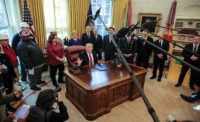President Trump has taken another step aimed at helping the U.S. steel and other industries by calling for a broadening of Buy American requirements for federal government infrastructure projects and other purchases.
But Trump's desired changes in the domestic-preference policy would hinge largely on a not-yet-written amendment to government procurement rules.
Moreover, it appears that Trump’s directive, signed on July 15, won’t affect federal-aid highway work—the largest federally funded construction program—which is covered by a different preference requirement, called Buy America.
Brian Deery, senior director of the Associated General Contractors of America's highway and transportation division, sees the executive order as "sort of tightening down" on some provisions of federal procurement regulations.
Deery says, "It will clearly have an effect on direct federal programs," such as the Army Corps of Engineers, Naval Facilities Engineering Command and General Services Administration. Those agencies bid and award construction contracts directly to contractors.
But he adds that the directive "absolutely will not have a direct impact on the federal-aid highway program." That program provides highway funds to states, which are the entities that award contracts.
A major part of the executive order would greatly expand the definition of foreign content for iron and steel end-products, setting the threshold at 5% of their total cost. That compares with a current foreign-content minimum of 50%.
Trump said at a July 15 White House event, “Currently, a product can be 50% foreign, and it still counts as American-made. Figure that one out.”
For non-steel and iron products, Trump initially is calling for a much smaller change, setting the new foreign-content level at 45%, compared with 50% now.
But the directive also asks federal officials to study a further cut in the non-steel foreign-content threshold, to 25%, with the change possibly coming “incrementally,” the document says.
In addition, the executive order seeks to change the formula for a federal agency to determine whether a company's contract bid price that uses U.S.-origin materials is "unreasonable or inconsistent with the public interest."
To boost the use of U.S. materials, the directive recommends that an agency add 20% to the materials prices in a competing bid that uses foreign-sourced materials. For a bid from a small firm that uses foreign materials, 30% would be added to the materials' prices.
Those plus-factors are much higher than the present ones, which are either 6% or, in cases involving small bid amounts, 10%.
To make those changes, the executive order looks to the Federal Acquisition Regulatory Council, saying that it "shall consider proposing" amendments to federal procurement rules within 180 days.
The rule-writing process can be lengthy. After a proposal is drafted, interested parties will have at least several weeks to submit formal comments. After those are reviewed, the council would write a final version.
The council is composed of the White House's head of federal procurement policy, as well as officials from the Dept. of Defense, GSA and National Aeronautics and Space Administration.
The American Iron and Steel Institute welcomed the executive order. In a statement, Thomas J. Gibson, the institute’s president and chief executive officer, called the directive “another positive step in ensuring the fullest possible implementation and enforcement of existing domestic procurement laws and ensuring the steel industry remains competitive.”
Trump's new executive order follows two others he has issued that deal with Buy American policy. In January, he issued a directive that sought to widen the types of materials the Buy American preference would cover and also expand the program from those funded by federal grants to other types of "federal assistance." [View ENR story here.]
That was a follow-on to an April 2017 executive order that had a major focus on reducing the use of waivers from Buy American requirements.



Post a comment to this article
Report Abusive Comment